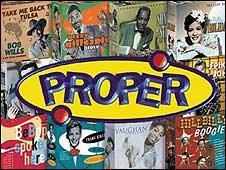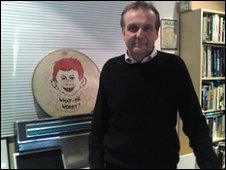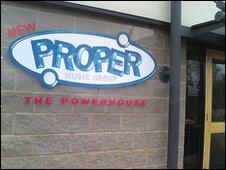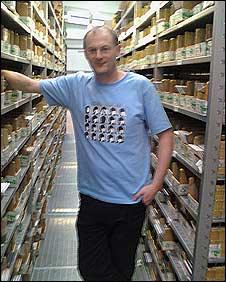How to sell music the Proper way
- Published

The Proper Box series of archive releases is a speciality of the label
As chairman of the UK's biggest independent music distributor, Malcolm Mills knows all about making money from the "long tail" of niche products that major record labels neglect.
"We were the anaconda of the business before the long tail was invented," he says of his Proper Music Group of companies, which supply folk, blues, roots and world music CDs to record shops across the country.
While the Big Four music firms are looking for hits that sell in the millions, the Proper Records label and the Proper Music Distribution company sell a very large number of titles in very small quantities.
In the Proper Music catalogue, newly-recorded albums by old stalwarts such as Joan Baez and Nick Lowe rub shoulders with repackaged archive material from jazz greats including Ella Fitzgerald and John Coltrane.
At the same time, Proper Music Distribution offers music from up to 600 different small labels from around the world.
"We have 125,000 product lines or thereabouts on our system," says Mr Mills.
Many, but not all of these are stored in a massive warehouse in the basement of Proper's headquarters, while the rest are obtained on demand.
"If somebody wants it, we can deliver it swiftly and efficiently. And we can make money out of selling one copy of something."
Rise of specialists
Distribution is one of the most important links in the music business chain that stretches from the recording studio to your living-room stereo.
There are plenty of enthusiastic amateurs running tiny record companies on a cottage-industry basis. But unless they can get their CDs into the shops or Amazon's warehouses, no-one will be able to buy them.
It doesn't help that the number of independent record shops in the UK is steadily dwindling - down to fewer than 300 at the last count, according to the Indierecordshop database.

Malcolm Mills is happy not to be top of the charts
But in order to survive, those small shops now tend to leave the mass-market chart-toppers to HMV and the supermarkets, with whom they struggle to compete on price.
"If you walked into a record shop 15 years ago, you'd have a chart wall of CDs and a chart wall of singles," says Proper's indie sales manager Graham Jones.
"Well, the traditional record shop has lost that market. They've lost the singles to downloading and they've lost the mainstream albums to the supermarkets."
Instead, many of them are now selling exactly the kinds of specialist music that Proper distributes.
Since the company was formed in 1988, it has steadily grown in size and now employs more than 60 people.
Proper's success in its field has earned it the title of Distributor of the Year two years running in the trade paper Music Week's awards.
However, there have been some high-profile casualties in independent music distribution over the years - most recently Pinnacle Entertainment, which went into administration in December 2008.
Safety first
So how is Proper thriving where so many others have failed?
"I can proudly tell you that we rarely trouble the Top 75 album charts," says Mr Mills. "So therefore, we are not chasing spikes in the business, if you like.

Proper's surroundings are not exactly glamorous
"If you have a number one record that suddenly puts £1m on the turnover in November, you take on people to deal with that - and an overhead that's commensurate with being able to cope with that demand.
"You don't throw those people out in January, they're still there. And you ride high on the hog for a bit.
"Come next November, you're looking for one-and-a-half more of those to beat where you were and to deal with the overhead that you've had to absorb in the meantime.
"Now we've never had that. We've stayed well and truly down the dusty end of the album charts, the cobweb end, and I like it - it's a nice, safe place to be."
Mr Mills quickly adds that this does not mean Proper is lacking in ambition. "We have records that sell in the tens of thousands - it's just that for us, the overall long-term quantity is generally more important than one week's chart position."
Still standing
Although Proper does handle distribution of digital downloads as well, it is happy to put the CD at the centre of its operations, despite widespread predictions of its imminent demise.
"The entire world is obsessed with the death of the CD," says Proper Music Distribution's managing director Stephen Kersley.

Graham Jones says record shops will never die
"But there were still 140 million CDs sold in the UK last year. I'm happy to have 2% or 3% share of that market, because it's the business that we've got right now.
"So if people want to assume that the CD's dead and get out of CDs, then we'll probably start to press more."
In the same way, Proper is keen to support old-fashioned record shops - "independent retailers who, through thick and thin, have kept their shops going," as Mr Mills puts it.
In fact, Proper's Graham Jones has written one of the best accounts of the plight of modern-day music retailers.
His book, Last Shop Standing, published by Proper Books, documents some of the most distinctive record shops left in the UK and explains why he thinks they will continue to thrive.
"I drove round the UK thinking I was writing the obituary of the record shop," he says. "But when I finished the tour, I was convinced that the record shops left still had a future."
Back to basics
Mr Mills says he has no need to house his business in "a massive tower block in the middle of downtown Los Angeles".
In fact, it's based on an industrial estate in the south London suburb of Beckenham.
But the drab location is somehow in keeping with the back-to-basics philosophy of the Proper group.
"This is how a record company in America used to be in the 50s," says Mr Mills.
"We do [music] publishing here, we distribute, we make records. We've got a recording studio downstairs, a world-class studio."
Artists who have recorded there include Andy Fairweather-Low, a former member of 1960s band Amen Corner, whose biggest solo success was the 1975 hit Wide Eyed And Legless.
"Andy Fairweather-Low can come here and make his new album, we can distribute it for him and do his publishing, do his publicity - he goes out on the road, we're selling the records.
"It's a complete rounded business, but in very, very old-fashioned terms."